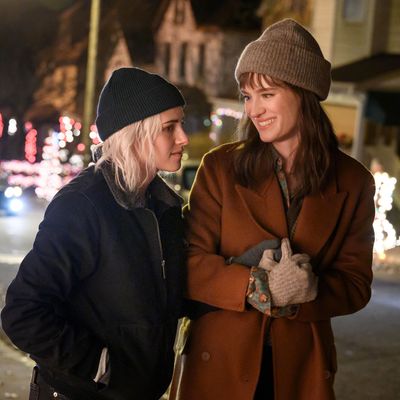
There’s an inherent conservatism to the Christmas movie as it’s been defined by the Hallmark, Lifetime, and, lately, Netflix industrial complex. Not in the political sense, though the mayoral aspirations of presumably Republican patriarch Ted Caldwell (Victor Garber) do play a key role in the new home-for-the-holidays romantic comedy Happiest Season. It’s more a matter of format — Christmas movies are intended to feel as snuggly and familiar as an old sweater. There are expectations to be met and standard elements to include. They can get away with being wacky or preposterous, so long as they’re devoid of sharp edges and unpleasant surprises. And while white heterosexuality is no longer the default setting, it’s been so central to the conception of the mini-genre that Happiest Season, which attempts the modest goal of bringing some queerness to an avowedly straight format, sometimes feels at war with itself.
That discordance is what makes Clea DuVall’s movie so interesting. Happiest Season stars Kristen Stewart as Abby and Mackenzie Davis as Harper, a couple whose lives of shared domestic bliss in Pittsburgh are disrupted after Harper spontaneously invites Abby home to spend the holidays with her family. Abby, who’s yet to meet her girlfriend’s parents, takes this step toward intimacy as a sign of seriousness. She decides that she’s not just going to propose, she’s going to go full-on archaic, as she tells her skeptical friend John (Dan Levy), in asking Harper’s father for permission. So it’s to more than Abby’s dismay that she learns, just before they’re due to arrive on the doorstep of the Caldwell household, that Harper’s family does not actually know about her existence. In fact, they don’t even know that Harper’s a lesbian, and have been told that Abby’s an orphaned friend their daughter has taken pity on and allowed to bask in the glow of their festive cheer that year.
But for the sake of the woman she loves, who insists she’s almost ready to come out, and for the sake of Happiest Season being a rom-com, Abby plays along. It’s a farcical set-up that allows for all sorts of misunderstandings, from furtive bed-hopping in a packed house to awkward encounters with exes who also happen to be home for the holidays. But despite all the cozy trappings, there’s a cruelty to what’s being asked of Abby that the movie doesn’t shy away from. She finds herself hovering on the outskirts of the celebration as Harper slips easily back into a past life Abby’s never been made privy to. While Abby is shunted aside to a spot in the basement, Harper’s off smiling in photos with her campaigning father and going out for catch-up drinks with her old friends. Ted and Tipper (Mary Steenburgen) don’t go into the details of their politics, but they do talk, in passing, about their homophobia, shaking their heads over the “lifestyle” of Harper’s classmate, Riley (Aubrey Plaza), who unbeknownst to them was also Harper’s high school girlfriend.
There are no indications that Happiest Season takes place in the past, though it feels like it could (and probably should) be set at least a decade ago. That said, there’s a certain relief that comes with the vagueness of its setting — Ted and Tipper may be uptight, bigoted WASPS, but if they were also Trump fans, it would really crush any chance of levity. As is, DuVall’s film isn’t exactly a laugh riot anyway, and aside from a few bits of physicality involving Alison Brie as Harper’s sister-rival Sloane, it opts for a sustained sense of lightheartedness over aiming for much by way of jokes. Stewart excels at many things, but comedy isn’t really one of them, and Happiest Season also just doesn’t find what’s happening to Abby all that funny. It’s one thing to have to lie about who you are, and another to have the person you’re lying on behalf of then abandon you in favor of playing at being the daughter her parents want to show off.
While Happiest Season doesn’t pretend that Harper would have an easy time telling her parents the truth about herself, it also doesn’t suggest that Abby has an obligation to wait until her girlfriend’s ready. The de rigueur happy ending may be expected, but it’s questionably satisfying, because so much of what’s come before has felt like it’s been not just about whether Abby fits into the household she’s visiting, but the very genre her story is a part of. The Happiest Season ultimately serves as evidence that the current Christmas movie is capable of accommodating a lesbian love story, but you’d be forgiven for thinking it could have just as easily ended with one of the characters driving off into the snowy night, middle finger extended. Proving a conservative format can change is well and good, but there’s also something to be said for just leaving it behind.
More Movie Reviews
- Fernanda Torres Is a Subtle Marvel in I’m Still Here
- Grand Theft Hamlet Is a Delightful Putting-on-a-Show Documentary
- Presence Is the Best Thing Steven Soderbergh’s Done in Ages


